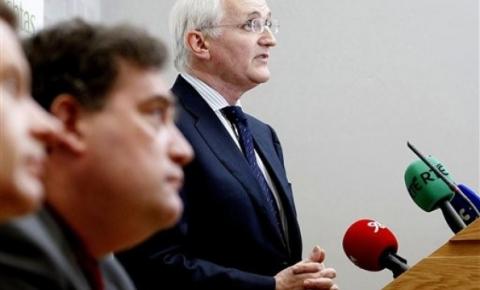Have the Greens done a deal with Fine Gael?

Why did the Greens pull out of government? And will we see them there again any time soon? By Colin Murphy.
A party that had displayed extraordinary (perhaps suicidal) patience with Brian Lenihan’s fiscal strategy and Brian Cowen’s leadership withdrew, because, “Our patience has reached an end", in the words of party leader John Gormley on January 23.
“There’s a lack of communication and a breakdown in trust,” he said. That much was clear with regard to Brian Cowen’s disastrous attempt to implement a cabinet reshuffle, apparently in the face of Green opposition.
(Vincent Browne’s haranguing of Dan Boyle on this issue did indicate a lack of clarity in any Green demands of Cowen. It seems likely that Cowen’s move was an attempted double-bluff: that he had assumed the Greens were bluffing when they said they didn’t agree with his strategy, and that they then felt forced to call his bluff when he went ahead.)
But given that the Greens succeeded in blocking the appointments, precipitating Cowen’s resignation, and that the Greens had signature legislation to get through before the dissolution of the Dáil, such as the Climate Bill, why did they go when they did?
The overt answer is that they were prepared to prioritise the Finance Bill above all else, despite the controversy around it. Another factor was that Fine Gael would be likely to have sought to introduce a similar bill had the original one not gone through. After a gradual decline in trust and communication (in which their unilateral announcement of a post-dated resignation, last November, was a key step), the cabinet issue was the final straw.
But maybe there was something more strategic in it. It’s been reported that Eamon Ryan opened up a “back channel” of communication with Fine Gael, via Simon Coveney, and had attempted to do the same with Labour, but been rebuffed. (Harry McGee the Irish Times, January 24.)
This channel allowed Ryan to respond rapidly to Brian Cowen’s resignation announcement. He contacted Coveney, who spoke to Enda Kenny and Michael Noonan. Agreement was secured for Fine Gael (and later Labour) to withdraw their motion of no confidence in return for an expedited passing of the Finance Bill.
This was in the interests of Fine Gael and Labour in two significant ways. It brought the election forward, undermining any possible attempt by a new Fianna Fáil leader to rally the troops, and gave a definite election date. Secondly, it effectively ensured the Finance Bill would get through, rather than being left festering as the first challenge of the new government.
So what did the Greens get? Precious little by way of public gratitude. The Finance Bill was passed, not likely to be a legacy that their members will cherish. Was that it?
Summer two years ago, the local elections and by-elections left the Green Party greatly reduced in terms of nationwide representation, but increased in Dáil influence because they held the balance of power. In June 2009 Garret Fitzgerald, in his newspaper column, suggested a course of action for them.
The Greens’ “best hope now lies in using this new bargaining power to secure policy reforms that might in time earn them a recovery in public support,” he wrote.
Their blocking of third-level fees might be seen as one such initiative.
“Having gained some kudos in this way, the Greens could later quietly sound out the Opposition informally on a possible deal under which, if they left the Government and precipitated a general election at a propitious moment for Fine Gael and Labour, one or two Greens, drawn from Senate of Dáil Éireann, would be included in a future government, enabling them to carry forward their very worthwhile environmental agenda under different auspices,” FitzGerald wrote.
Would this, he asked, be “a Machiavellian agenda”? And, answering his own question: “Why not? All is fair in love and politics and, if they wish to survive, small political parties need to be prepared to deploy skilfully and ruthlessly any bargaining power they may occasionally acquire.”
Perhaps the Greens were reading.
John Gormley has said he would be willing to enter coalition with Fine Gael. With current poll trends, the possibility of Fine Gael voters strategically directing their transfers away from Labour and to the Greens and Independents, with a view to making a minority Fine Gael government a possibility, is growing. A Fine Gael-Green-Independents deal is at least a possibility.
And whether or not there is a Green Party presence in the new Dáil, Enda Kenny will have the prerogative of appointing Greens to the Seanad – and from there to the Cabinet (though that last step would likely be a step too far for a party with no Dáil representation, I assume). But a Seanad appointment would at least guarantee them something of a national profile, around which to rebuild.
It might be fanciful thinking. But it would be nice to think that, when the Greens sold their soul in June 2007 (as Ciaran Cuffe put it), they at least gained some cunning.
